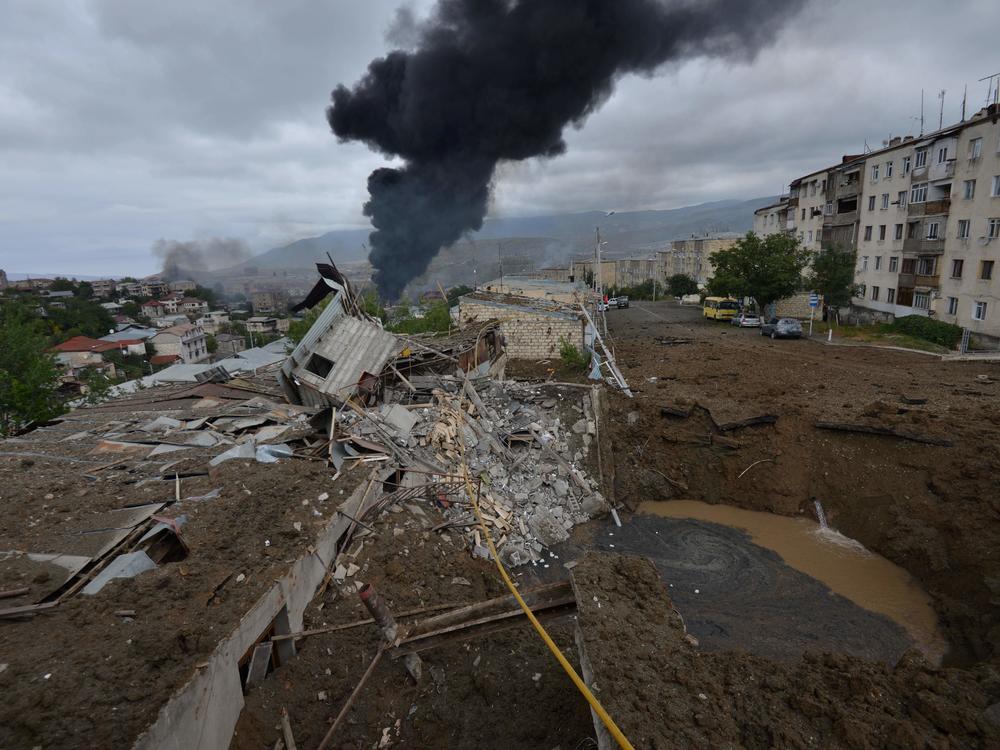Section Branding
Header Content
Destruction Mounts As Azerbaijan And Armenia Increase Hostilities
Primary Content
A decades-long dispute over territory in the southern Caucasus has led to open hostilities between Azerbaijan and Armenia this past week. Azerbaijan's second-largest city, Ganja, came under attack Sunday, with government officials saying Armenia had launched missiles into residential areas. Armenia has denied the charges; the leader of the territory at the center of the dispute said his forces were responsible for the attack.
Azerbaijani officials said one civilian was killed in the attack, and 32 more were injured.
"Opening fire on the territory of Azerbaijan from the territory of Armenia is clearly provocative and expands the zone of hostilities," Azerbaijani Defense Minister Zakir Hasanov said in a statement, the Associated Press reported.
The "insane Political-military leadership of Armenia" is a threat to regional peace and security, Hikmet Hajiyev, an aide to Azerbaijan's president, wrote on Twitter. "Azerbaijan retains its right to take adequate measures against legitimate military targets to defend civilians," he added.
Armenia denied the charges. "No fire of any kind is being opened from the territory of Armenia in Azerbaijan's direction," the nation's defense ministry said.
The hostilities have to do with the disputed territory of the Nagorno-Karabakh, known locally as Artsakh, which the two former Soviet republics have competing claims to. The territory itself is closely allied with Armenia. The fighting has engaged allies in the region, including Turkey, which has pledged its unwavering support of Azerbaijan, which is ethnically Turkish.
Nagorno-Karabakh's leader said his forces were responsible for the missiles. "As act of self-protection, in response to days long deliberate shelling" with "prohibited cluster munitions ... I ordered to bombard Ganja military facilities," Arayik Harutyunyan said on Twitter.
Harutyunyan said he had later given an order to stand down, "to avoid loss among civilians." But he promised a "commensurate response" against military targets should Azerbaijan continue its aggression.
The latest fighting, which broke out one week ago, is the most sustained and serious violence the region has seen in years, and has involved heavy artillery, tanks and missiles. The BBC reports more than 100 confirmed deaths between civilians and combatants on the Armenian side. Azerbaijan hasn't released details on military casualties, but said that 24 civilians have been killed and over 100 wounded.
"We don't know exactly what caused this recent flare-up," NPR international correspondent Lucian Kim told Morning Edition shortly after fighting began. "Both sides are blaming each other, but Azerbaijan has vowed to take back Nagorno-Karabakh. And this time, it's getting the support from Turkey."
On Thursday, Armenia's military said it had shot down four Azerbaijani drones near the Armenian capital of Yerevan. Last week, Turkey denied that its aircraft or drones were being used against Armenia. But Armenian officials said that Turkish military advisors were directing the operation from the ground. According to the BBC, Turkish military drones are being used in the conflict.
On Friday, the International Committee of the Red Cross warned that civilians were being killed on both sides of the conflict.
"People have been in touch with the ICRC who are terrified for themselves and their families and at a loss as to where to go or what to do to stay safe," said ICRC's Eurasia regional director Martin Schüepp. "They are caught in the crossfire and deeply fearful for their safety and future."
Copyright 2020 NPR. To see more, visit https://www.npr.org.

